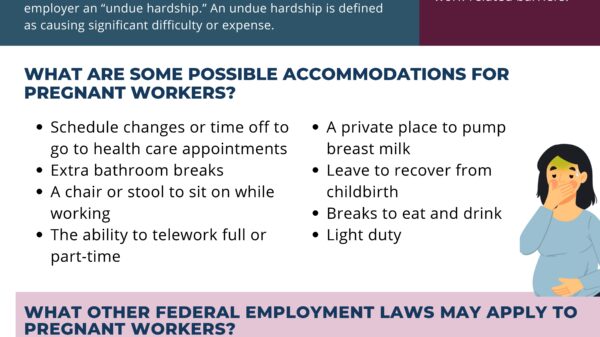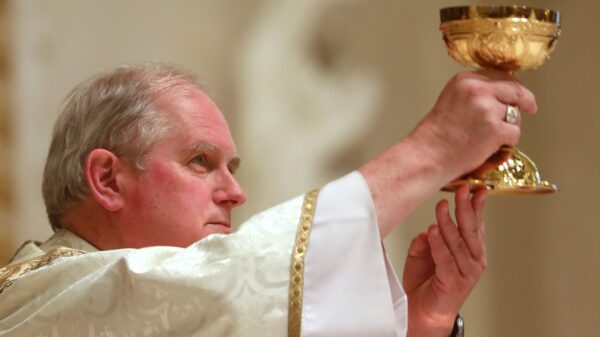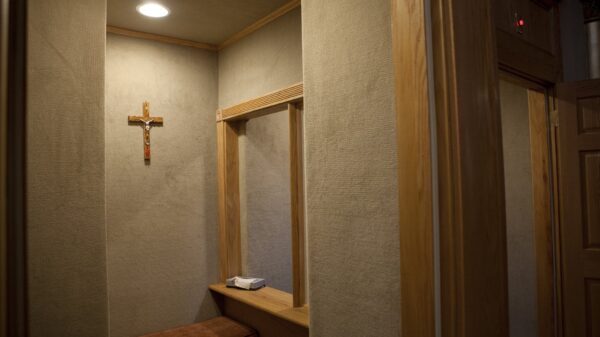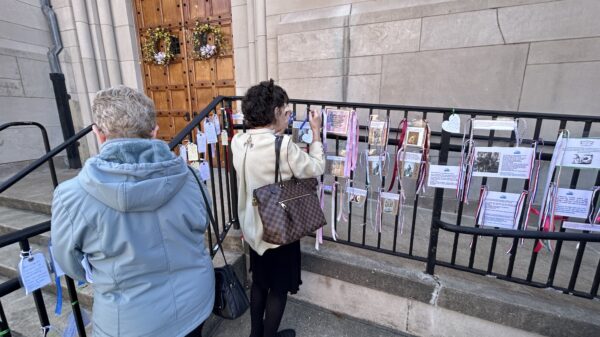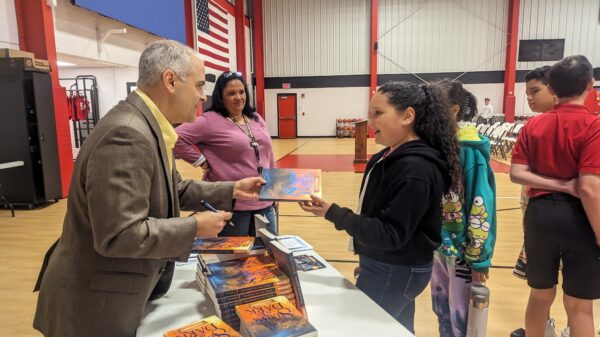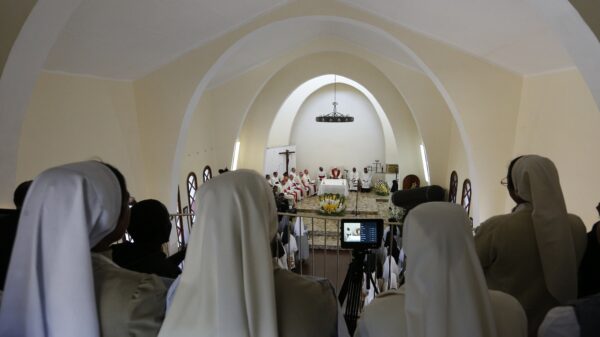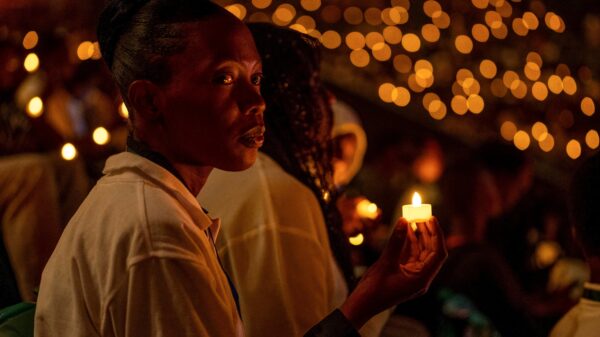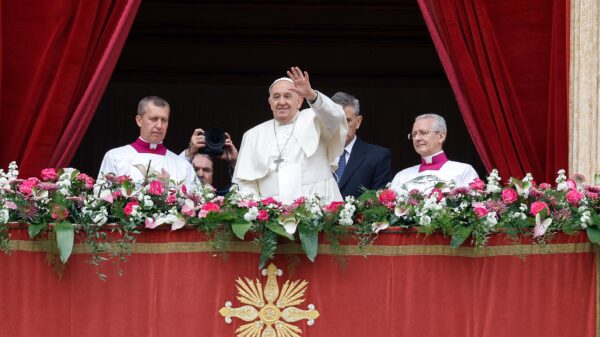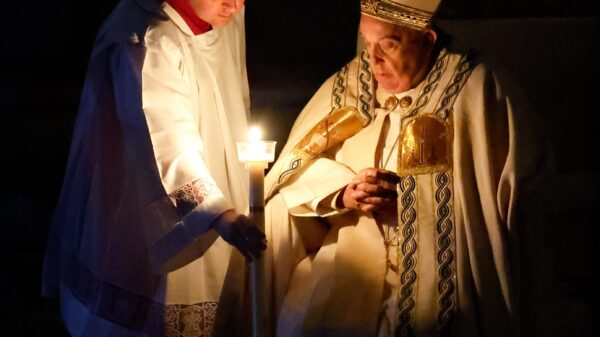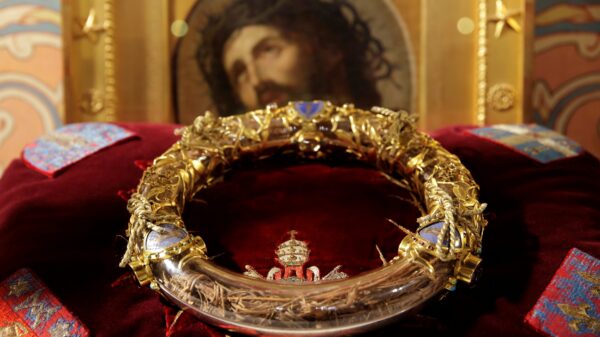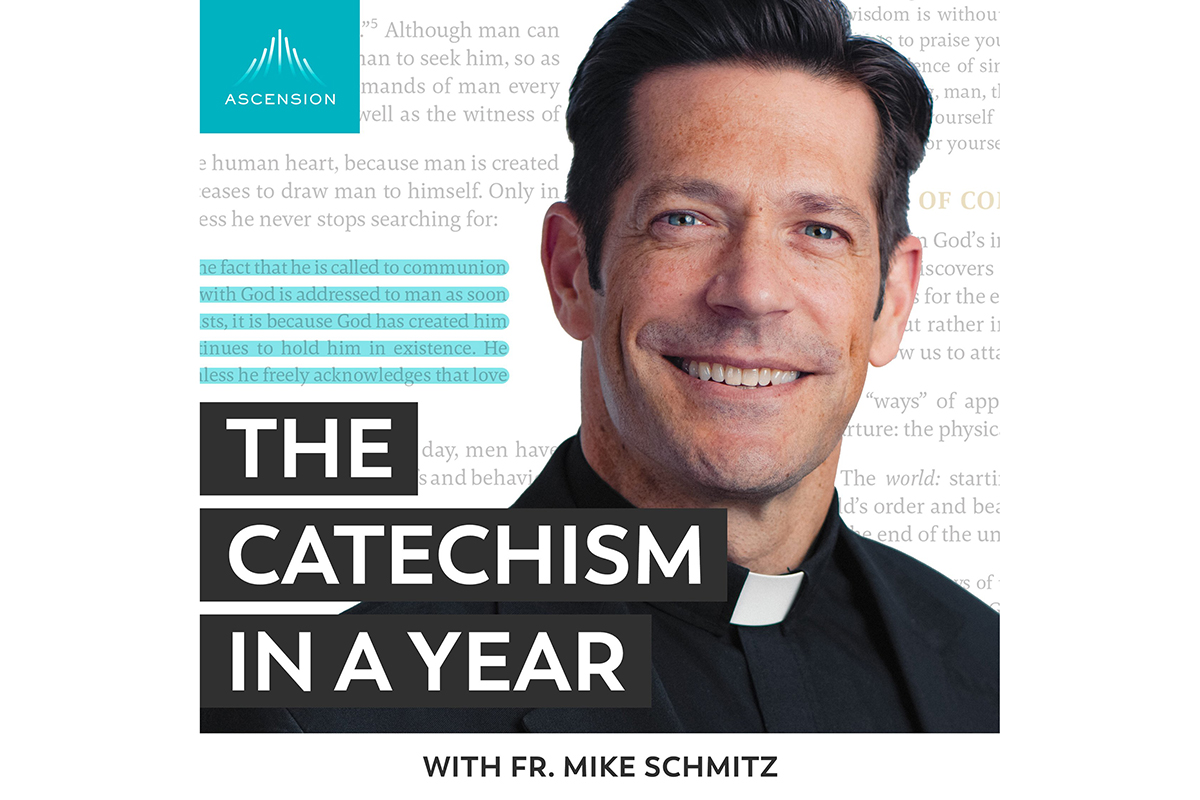(OSV News) — “Oh ya baby!” read Jane Hernandez’s Facebook post, adorned with a heart-eyed, smiley face emoji. The Nov. 22 message was paired with an image from a package tracker, showing an item as being just four days away.
The anticipated purchase: a new copy of the Catechism of the Catholic Church — and just in time for “The Catechism in a Year (with Fr. Mike Schmitz)” podcast’s 2023 debut.
Hernandez, a lifelong Catholic who lives in central Nebraska’s Sandhills, is among more than 93,000 members of an official Facebook group for “The Catechism in a Year (with Fr. Mike Schmitz).”
“I’m hoping that it shows me the way to be a better Catholic, to be a better person, better able to follow God’s word,” Hernandez, 60, said of the podcast.
The Jan. 1 launch of “The Catechism in a Year” podcast has generated notable excitement — especially among listeners of “The Bible in a Year (with Fr. Mike Schmitz)” podcast, which jumped to the No. 1 spot on Apple podcasts overall within 48 hours of its 2021 New Year’s Day launch.
Even before its launch, “The Catechism in a Year” hit No. 1 on Apple’s “Religion and Spirituality” chart, with “The Bible in a Year” at No. 2, as of Dec. 27. Both are products of Ascension, a Catholic publisher based in West Chester, Pennsylvania.
Part of the appeal of both podcasts is the host, Father Mike Schmitz, a priest of the Diocese of Duluth, Minnesota, who had a robust social media presence prior to the podcast, and the podcast’s occasional commentary from Jeff Cavins, a Scripture scholar and former host of EWTN’s “Life on the Rock,” now living in a Minneapolis suburb.
Father Schmitz told OSV News he initially pitched the idea of a podcast exploring the Bible and the catechism simultaneously, but Ascension leaders “wisely” advised him to focus on one at a time.
“After reading through the whole Bible, I think people want to connect the dots,” he said. “They now understand the story of salvation in Scripture, they’re seeing the world through the ‘lens of Scripture.’ But how does that connect to the seven sacraments, to Catholic traditions, to the 2,000 years of history in our Catholic Church? I think people are curious and spiritually hungry and want to see how we got from the Acts of the Apostles to where the church is today.”
Cavins suspects there’s something more to the widespread interest in “The Catechism in a Year” beyond the success of “The Bible in a Year.” He credits the Holy Spirit, but he also thinks anticipation is sparked, in part, by the national and international turmoil of recent years, from U.S. politics to the pandemic, and people’s hunger for real truth.
“People are confused. They are hungry, they are scared, and we are offering them a sure foundation,” said Cavins, who developed the popular “The Great Adventure Bible Timeline,” the organizational basis for “The Bible in a Year” podcast.
Searching for answers
Other Catholic catechetical leaders agree that cultural confusion and division are driving Catholics’ desire to better understand the faith.
“I think people have seen a lot of chaos and a lot of things that just aren’t right, and that they have this desire to know the truth, and to understand why we do what we do,” said Kelly Wahlquist, executive director of the Archbishop Flynn Catechetical Institute, which Cavins helped to found in 2008 at The St. Paul Seminary in St. Paul, Minnesota.
This year, the Catechetical Institute’s two-year foundational course “Pillars” is at its highest enrollment yet: 697 students between its first-year and second-year classes.
Polarization not only within broader society but also in the church has prompted people to wonder what the church actually teaches, said Donna Grimes, assistant director of the U.S. Conference of Catholic Bishops’ Secretariat of Cultural Diversity in the Church. In recent years, Catholic thought leaders have shared conflicting information about the church’s stance on controversial issues, including same-sex attraction, the liturgy and women’s role in the church — some of the same issues that received attention on diocesan and national levels in preparation for the worldwide Synod on Synodality.
“We have a duty and an obligation to really share the faith, to accompany people as they are exploring and growing in the faith and to continue to encourage that growth. And it just can’t be done without a focus on adult faith formation,” said Grimes, a longtime catechist and author of “All God’s People: Effective Catechesis in a Diverse Church” published in 2017 by Loyola Press in Chicago.
Grimes said anticipation for “The Catechism in a Year” podcast is not the only indicator that many Catholics want to better understand their faith, including Catholics from diverse ethnic communities, who may come from parishes without resources for paid faith formation staff, she said. She pointed to the success of the Institute for Black Catholic Studies at Xavier University of Louisiana in New Orleans and the Sankofa Institute for African American Pastoral Leadership in San Antonio, Texas.
Other initiatives underway include the OSV project Real+True, which includes videos and other content “to unlock the beauty and wisdom of the Catechism” and help people discover Jesus.
“The Catechism is not a textbook, a collection of ideas, or a set of rules. It is the faithful echo of a God who wishes to reveal himself to us and desires us to respond,” its website states.
Catechism’s history
Religious instruction in the Catholic Church has long included “catechisms,” or written summaries of core Catholic beliefs.
According to the USCCB’s website, a catechism is a book that “contains the fundamental Christian truths formulated in a way that facilitates their understanding,” and can be either “major” or “minor.”
“A major catechism is a resource or a point of reference for the development of minor catechisms,” it states, pointing to the Catechism of the Catholic Church as an example of a major catechism, and the U.S. bishops’ 1885 Baltimore Catechism as an example of a minor catechism.
In 1992, Pope St. John Paul II issued the Catechism of the Catholic Church for universal use, with an English edition published in the United States in 1994. It was updated in 1997, and then revised in 2018 by Pope Francis.
In 2005, Pope Benedict XVI issued the Compendium of the Catechism of the Catholic Church, a synthesis of the catechism in Q&A format.
Catechism and Bible connections
The Catechism of the Catholic Church is organized in four parts based on the Apostles’ Creed, the sacraments, the Ten Commandments, and Christian prayer.
Jane Hernandez, author of the Facebook post celebrating her enroute catechism, became interested in “The Catechism in a Year” podcast after following “The Bible in a Year” in 2021. As with the Bible, she had tried several times to read the catechism — and even tried to listen to it on Audible — but it didn’t “stick,” she said.
“After ‘Bible in a Year,’ I was able to really hear God’s Word, and I want to follow him the best way that I can,” said Hernandez, who works as a project manager for a medical software development company. “I think the catechism is part of that. It’s giving you … the structure to follow him — what should you do in order to be a good Catholic? That’s what I’m looking for.”
Like Cavins and others, Hernandez thinks people are eager to sift through confusion about church teaching and how they should live. “People are just thirsty. They’re hungry for this information, so that’s what I think is driving a lot of (interest),” she said.
Cavins acknowledged that “The Catechism in a Year” may not attract as many listeners as “The Bible in a Year,” which again topped Apple podcast’s charts at the beginning of 2022 and hovered at No. 25 in the United States at the end of the year. However, “CIY” listeners familiar with Scripture — including “BIY” devotees — will be rewarded by the connections they see between the Bible and the catechism, he said.
The Bible tells the story of salvation history, and the catechism shows a person how to join that story, he said. Cavins said approaching the catechism through that lens elevates it beyond the reference-book status it currently enjoys in many Catholics’ homes.
“You can present the message of the catechism two ways: One, it’s information and data about Catholicism. … It’s not going to be successful, and no one’s going to be that interested in it. And unfortunately, that’s sort of where it’s stuck right now,” he said. “The second is, it accompanies the (salvation history) story, and you’re in the story. And this is what’s going to help you live that story in a practical way.”
Faith must be shared
Petroc Willey and William Keimig, leaders of the Catechetical Institute at Franciscan University of Steubenville, which partners with 111 dioceses and has 1,000 new people a month connecting to their offerings, said that initiatives like “The Catechism in a Year” tap into “immense amounts of hidden strength in the church” and people’s “zeal … to be fed,” but that for faith formation to truly take root, it must be shared with others.
Even the best content can not replace the role of relationships in conveying the faith, said Keimig, the institute’s assistant director.
“However good the topics are … a desire to access it does not become consistent or sustained in an adult’s life unless it is accompanied by some structure or relationship,” he added.
Willey, the institute’s director and a professor of catechetics, suggested that the podcast’s listeners “make a decision to share one thing that struck them, either because of its truth, its beauty, its ‘hitting home,’ and share that with one other person every week.” That could be done with a friend or in a small group, he said.
In recent decades, Cavins has observed a rise in popularity for apologetics and Scripture study, and he thinks the church may be ripe for the catechism to have its own moment. Diocesan and parish faith formation leaders can leverage that, but the key, he said, is approaching the catechism as “an activated disciple who’s on mission with Christ” and who needs a guide, rooted in Scripture, to how to live as a Christian.
“I think we’re going to see an era where people are going to understand their faith better than they ever have in any other generation in American history,” Cavins said. “They’re going to understand their faith and … the proof will be in the pudding when people start sharing Christ with others.”
Maria Wiering is senior writer for OSV News.


